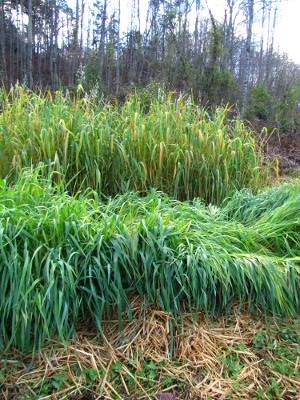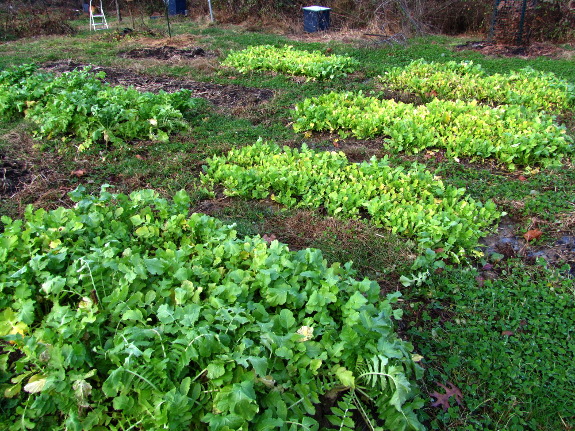
When to plant winter cover crops
 Last
year, my cover crop experiments helped me determine the best species
for our garden, so this year I'm just fine-tuning the process.
One factor I wanted to figure out was the optimal planting time for my winter
cover crops.
Last
year, my cover crop experiments helped me determine the best species
for our garden, so this year I'm just fine-tuning the process.
One factor I wanted to figure out was the optimal planting time for my winter
cover crops.
I filled up garden beds
with oats and oilseed radishes whenever they became available between
July 20 and September 15. The photo to the left shows two beds of
oats, the one in front planted August 31 and the one in back planted
August 10. This may not always be the case, but with this year's
extended autumn weather, August 10 was just too early to plant oats if
I don't want them to go to seed, while August 31 allowed for a lot of
vegetative growth without promoting flowering.
On the other hand,
planting just two weeks later, on September 15, seemed to be a bit too
late for optimal oat growth. The oats came up, but didn't get a
chance to grow big enough to completely cover the soil and do their job
of erosion and weed prevention. September 9 is the latest
planting that I felt grew sufficiently.

Oilseed radishes had a
simpler planting request --- the earlier the better. Beds planted
August 2 grew hefty radishes like the one shown in the foreground while
beds planted a month later (in the background on the right) look a bit
puny.
It sounds like I should
plant my cover crops in waves next year --- buckwheat from the last
frost until the beginning of August, oilseed radishes until the middle
of August, then oats from late August through early September.
Your region will probably have a slightly different planting schedule,
but chances are the same trend will apply.
Want more in-depth information? Browse through our books.
Or explore more posts by date or by subject.
About us: Anna Hess and Mark Hamilton spent over a decade living self-sufficiently in the mountains of Virginia before moving north to start over from scratch in the foothills of Ohio. They've experimented with permaculture, no-till gardening, trailersteading, home-based microbusinesses and much more, writing about their adventures in both blogs and books.
Want to be notified when new comments are posted on this page? Click on the RSS button after you add a comment to subscribe to the comment feed, or simply check the box beside "email replies to me" while writing your comment.

So I guess that I'm too late to start planting cover crops? hehe
But seriously, the frost will kill off the oats? How do you handle them? I guess you compost the bio-mass that they build up. But what about the root system? Are they pulled up, tilled in, etc?
As for the oilseed radishes, I know they winter kill. But does that kill take out the tap root? I would think that any tap root would be a pain to deal with in the garden. And I see that it is supposed to be rotated since it is in the mustard family. Do you have a cover crop rotation schedule like you do for the "real" crops?
stions! I choose cover crops that winterkill specifically so I don't have to pull them up, till them in, etc.
Oilseed radishes work well with early spring plantings since they completely deteriorate and leave nearly bare soil by March or so here in zone 6. The taproot, surprisingly, completely melts into the soil. (Maybe I just have a lot of worms? More likely, it's just that the taproot is very succulent.)
I try to plant oats where I'll be either transplanting early (broccoli, for example) or direct-seeding after the frost free date in May. By then, the oats have formed a mulch about half as thick as I usually apply when I add straw to the garden and the roots have been eaten up by soil microorganisms. So I just transplant directly into the mulch or rake it back to mulch the bed edges while I scatter seeds on the bare soil.
All winter cover crops don't behave so nicely --- that's why I settled on oats and oilseed radishes. If you live further south, you might not get as good winterkill with even these, but further north you'll have more choices.
I haven't really bothered rotating with my cover crops, but I will if I see a problem. I tend to get a somewhat natural rotation since I've been focusing my oilseed radishes in the back garden, which needs a lot of soil improvement, and I don't plant crucifer crops there because they can't handle the poor soil. In a vegetable garden, oats only share the same family as corn, and they're so different I doubt you'd see much problem if you planted one directly after the other. Rotation is a factor to consider, though, if you have crucifer diseases that hang around in your soil.